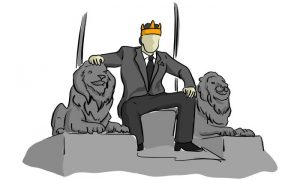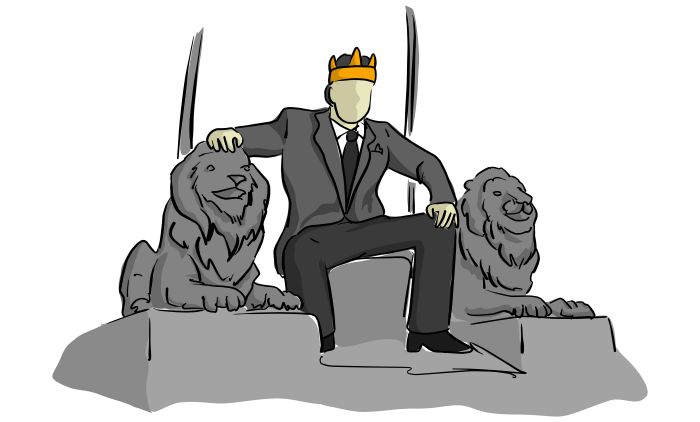In an interview with ProMarket, Open University’s Peter Bloom talks about his provocative new book CEO Society and why he believes celebrating corporate CEOs too much erodes democratic values.
 In the past few days, multiple media outlets reported that former New York mayor Michael Bloomberg is (again) considering running for president in 2020.
In the past few days, multiple media outlets reported that former New York mayor Michael Bloomberg is (again) considering running for president in 2020.
Bloomberg joins a crowded field of billionaires and business executives reportedly considering a presidential run. Starbucks executive chairman and former CEO Howard Schultz announced his departure from the company this month in preparation for a potential presidential run. Billionaire investor Marc Cuban is mulling his options. Earlier this year, a potential run by Oprah Winfrey was the subject of heavy media speculation (until she ruled it out). Mark Zuckerberg, currently up to his neck in data and privacy scandals, was also talked about as a viable candidate less than a year ago. A recent study found a sharp increase in the number of corporate executives elected to federal office between 1980 and 2014. And that’s without counting President Trump, the “CEO-in-Chief.”
The notion that success in business equips corporate executives with the tools necessary to run a country goes deeper than a Trump effect. Whether it’s Steve Jobs or Warren Buffett, Elon Musk or Jeff Bezos, successful CEOs are arguably the prominent cultural icons and heroes of our time, often portrayed as bold innovators, oracles with hidden insights into the workings of capital markets, benevolent philanthropists committing most of their fortune to charity, or simply as celebrities and media stars.
Part of it, no doubt, has to do with the dysfunction of the American political system: while politicians scramble to achieve very little, CEOs are seen as doers, makers and go-getters, outsiders who know how to really “get things done.” This lionization of corporate executives has remarkably survived the 2008 financial crisis and various scandals related to the conduct of charismatic CEOs unscathed.
 In their recent book CEO Society: The Corporate Takeover of Everyday Life, Peter Bloom and Carl Rhodes argue that the widespread veneration of successful CEOS has made corporate leadership “the model for transforming not just business, but all spheres of life.” This, they argue, serves to justify the existence of an extremely unequal system and weaken democratic values. Ultimately, they write, it contributes to a “transfer of responsibility for public good from democratic institutions and into the hands of the wealthy, so as to be administered by an executive class.”
In their recent book CEO Society: The Corporate Takeover of Everyday Life, Peter Bloom and Carl Rhodes argue that the widespread veneration of successful CEOS has made corporate leadership “the model for transforming not just business, but all spheres of life.” This, they argue, serves to justify the existence of an extremely unequal system and weaken democratic values. Ultimately, they write, it contributes to a “transfer of responsibility for public good from democratic institutions and into the hands of the wealthy, so as to be administered by an executive class.”
To hear more about this take, we recently interviewed Bloom, a senior lecturer and head of the Department of People and Organizations at the UK’s Open University.
[The following conversation has been edited for clarity and length.]

Q: What was it that got you interested in the notion of “CEO society”?
The book started out of a real curiosity. There was such a discrepancy, even in bottom line terms, between the actual value added by an executive and the popular perception. At a time where it seems like every other day there’s a new headline about the immorality of corporate executives, it’s strange that there is still this desire for an executive savior, whether in the workplace or politically.
When we started doing more research into this, that took us into the ways this went far beyond just corporate culture, or even just one political election. That this was actually a way of viewing the world, a very corporate way, in which executives are visionaries who can lead us and that we really need to put our faith in them.
We were examining how at all these different levels, even as crony capitalism is being challenged in the public consciousness from both the right and the left and there’s a growing consensus that this is not a great system, the corporate executive—not necessarily individuals, because I think there are huge questions about individual corporate executives, but as a figure—has largely been left unscathed. And that was worrying for us because we see that as a way in which the worst parts of this kind of neoliberalism are being continually reified.
The beating heart of our argument is that public responsibility has completely gone into the private hands of this kind of executive figures and that is denigrating our democracy and perpetuates the very oligarchy that we’re meant to be fighting if we actually want to have a sustainable economy, if we want to have a sustainable society and if we want to have a sustainable future.
Q: You describe “CEO society” as a product of “decades of neoliberalism.” But businessmen have been venerated and seen as more competent than politicians, certainly in America, for decades. You yourself mention Henry Ford, Rockefeller, and Carnegie. What has changed since then?
I think you make a very good point, which is the fact that this has very strong historical precedents where this kind figure has been venerated and [served] as a vehicle to support not only a particular kind of dynamic CEO— the innovators, the inventors, the entrepreneurs—but also in many ways as a justification for inequality. In an interesting way, we do see a kind of return to the Gilded Age of the 19th century, where there really was this almost godlike belief in the power of the CEO, one that in many ways repeated itself in the early 20th century when they became the drivers of progress and technological progress in the modern era.
Beginning with the 1980s in particular, there was a shift from the postwar consensus, where the CEO in many ways was the epitome in a certain sense of a kind of staid conservativeness, to the CEO as maverick, the CEO as master of the universe. It definitely played on the legitimate desires of wanting personal freedom, a sense of living in an aspirational society, and also being able to duck the rules. The entirety of the neoliberal free market revolution at the time, in many ways, was around ‘You’re caught in red tape and your life is defined by these governing regulations,’ and here are these figures who were not afraid to break the rules, who weren’t afraid to be mavericks, who weren’t afraid to do what they needed to do. Figures like Lee Iacocca really became almost iconic.
What you saw in the 90s was an evolution of that. In the nineties there was a real sense in which CEOs were visionaries and the drivers and our new smart society, that these were the people who were going to take us into the 21st century. There’s a difference between Bill Gates and Steve Jobs on the one hand and Lee Iacocca on the other, because in the popular perception it’s not just about profit for these two, but about driving us forward, making us smarter. Ironically, it was this type of veneration that helped mask how much power they were amassing.
This really cemented a deeper, more crystallized belief that these corporate executives held a wisdom that went beyond what other people had. And it hasn’t only affected corporations, which continue to invest in these kind of CEO visionaries when it doesn’t usually work out, but in a broader sense.
| “There’s a real way in which politics and democratic politics at all levels have increasingly been disempowered. As that happened, people have ironically turned to businessmen and CEOs as the people who can drive this change.” |
Q: Not all CEOs are the same, though, and not all are treated the same way. You explore some different types of CEOs yourself. There are celebrity CEOs, like Richard Branson, who are known mostly for their lifestyle; innovating CEOs like Steve jobs or Larry Page who are mostly known for their technological vision; and CEOs famous for their business acumen, like Warren Buffett.
Absolutely. There is a complexity there and I think that’s an important aspect. Whereas it’s easier to dismiss the celebrity CEO, the innovator kind, in many ways, goes much deeper because there’s a certain amount of legitimacy there. It’s not illegitimate to think that they’d be able to be successful, which makes it even more important to say okay there’s still a problem with this kind of executivization and they still have incredibly problematic business practices.
The Warren Buffet type is really interesting, this kind of fortune-teller CEOs, the ones who are able to predict the future. In a very uncertain volatile market, they’re the ones who can see what’s going to happen.
These are three different types of CEOs and the different categories require a different kind of investigation and in many ways critique. But they all represent a similar type of investment and fantasy in this kind of executive figure.
Q: In recent years many wealthy CEOs, like Mark Zuckerberg, have pledged to give away a majority of their fortunes—billions upon billions of dollars—to charitable causes. In the book, you criticize this kind of “philanthrocapitalism.” What is wrong with it?
We see three main problems with it. The first is the fact that a lot of the time it’s not actually overtly charitable. For instance, [Zuckberberg’s] wasn’t a charity, it was a limited liability company. So there’s a lot of ways in which instead of actually just paying their taxes or paying their fair share or contributing to society in a way that was more democratic and transparent and open, they’re using this as a means for strong PR, being seen as having a strong social function when really they’re just moving one profit base to another base, without necessarily doing a huge amount of good.
The second issue that we have is that it feeds into the exact ethos we just spoke about, the idea we can’t trust government to do anything and we certainly can’t trust democratic organizations to do anything, so what you need is for CEOs to come in and use their executive skills to solve the world’s problems. I think that’s a really dangerous mindset for a whole range of reasons. It not only detracts from the power of democratic governance at all levels, it also again reifies CEOs, many of whom are responsible for causing the problems they’re trying to fix or at least exacerbating them, as saviors.
The third problem is the way in which it plays into another mindset where not only do you put private good over public good, you give CEOs a lot of power to decide what is good and not good, because in the end it’s their money, they can decide what to invest in or give to.
It’s also the way in which they’re continuing to reinforce a very unequal system. In that respect, they’re just giving a Band-Aid to a much more systemic wound.
These are really dangerous trends. Even though there is a need for greater generosity, it’s dangerous in the ways in which it’s being led by executives and the reasons that they are leading it.
Q: We can’t escape the fact that the veneration of CEOs over the last few decades happened in conjunction with the complete dysfunction of our political systems. The blossoming of the CEO’s image as a person who is able to actually accomplish things coincided with politicians not accomplishing all that much.
That’s a really important point and one that we explore further in the book. There’s a lost faith in politicians, not the least because of crony capitalism.
There’s a real way in which politics and democratic politics at all levels have increasingly been disempowered. As that happened, people have ironically turned to businessmen and CEOs as the people who can drive this change. The rise of the entrepreneurial society has an interesting ethos of “we don’t need traditional power structures, we can make our own value and our own ways of doing things.”
The flip side of that is that it’s a worrying illiberal and authoritarian mindset. If democratic politics doesn’t work then people say, ‘Well, governments and particularly democratic governments are ineffective and we need a strong leader to get things done and to be effective and to solve all our problems.’”
| “It’s not just that crony capitalism has decayed our public institutions, it’s decayed our democratic practices and our democratic abilities.” |
Q: The United States is currently governed by a CEO, and numerous other CEOs are reportedly considering also considering running for office. In the book, you draw a link between the cultural idolization of corporate executives and the recent rise of authoritarian politics. Can you elaborate?
Yes. The connection hasn’t been made enough and needs to be made more. In this book, we’re trying to show the ways in which corporatism has invaded all areas of our lives and created a fantasy that allows for political authoritarianism and illiberalism the world over. If you want to realistically challenge this rapidly rising authoritarianism and illiberalism, you really need to look not just at the structural ways in which crony capitalism contributes to this, but also the sociology of authoritarianism that’s very much linked to a corporate culture that has now expanded beyond the boardroom, beyond the corporation, to society at large.
I think that the more crony capitalism helps contribute to an ineffective public sector, the more people turn to executives or private actors to solve our problems. Democracy is not just an ideal, it’s a process, one that has to be continually updated, rebooted, and performed so that it can be dynamic and people can learn the skills to make democratic decisions together and to really think about as citizens what is a public good and how to best achieve this. It’s not just that crony capitalism has decayed our public institutions, it’s decayed our democratic practices and our democratic abilities.
Another aspect of that, though, is the fact that questions of administration or governance have become a kind of bad word. Government in and of itself is seen as evil, regulation in and of itself is seen as an evil. You don’t see government as a democratic or representative government, you actually see government in itself as the problem, not the solution, as Reagan said.
This mindset affected not only strictly liberal democratic capitalist countries. China is a really interesting example of this, where you have a culture that is marketizing incredibly quickly, but is also becoming more and more authoritarian again, after a period of social liberalization, around this kind of CEO-type leader. Again, it’s this idea that this leader knows how to get things done and knows how to win in a competitive marketplace that’s very volatile, and that you need this executive role to master and shape a market society. I think that’s a really dangerous precedent, and it’s happening globally.
Q: It helps that we can more easily find recent examples of CEOs who accomplished things that benefited society at large than elected officials who did.
Absolutely. There aren’t a lot of role models of success who aren’t executives, people who we can say “these are really people who got things done and really made a huge social difference.” You don’t turn on the news and see examples of participatory budgeting, or the ways in which you have clusters of SMEs who are collaborating, amidst competition, to actually make really dynamic and interesting policies. What you see is the executive leading the way, often times versus ineffectual or scandal-ridden politicians. This creates a dichotomy in people’s minds: these are the people who get things done, and therefore these are the people who can lead us and save us and these are the people I should try to emulate.
Q: Should we disqualify CEOs as political leaders entirely, though? Sure, there are many bad CEOs, but arguably you just need to put the right one in charge.
For us, we want to push back against that because when you have a transferring of public responsibility and public good to private actors—even the best private actor, even the most ideal CEO—that’s still a very dangerous precedent. It’s a very dangerous trend. This idea that someone can come in and use their vision and in a top-down way just make things happen because of their personal abilities and charisma is something that threatens the very foundations a democratic society and a democratic culture and it’s one that justifies inequalities of power and the idea that our only options are to choose between a bad oligarchy and good oligarchy.
As we move forward, society is only going to become more complex. The more we turn our attention to believing that there’s one person who’s going to understand it all and make sense of it all for us and lead the way, the more threatening that’s going to be. We need to be actually having serious conversations about the complexity of the world and the ways we can actually be empowered together to change it in positive ways.
Disclaimer: The ProMarket blog is dedicated to discussing how competition tends to be subverted by special interests. The posts represent the opinions of their writers, not necessarily those of the University of Chicago, the Booth School of Business, or its faculty. For more information, please visit ProMarket Blog Policy.






